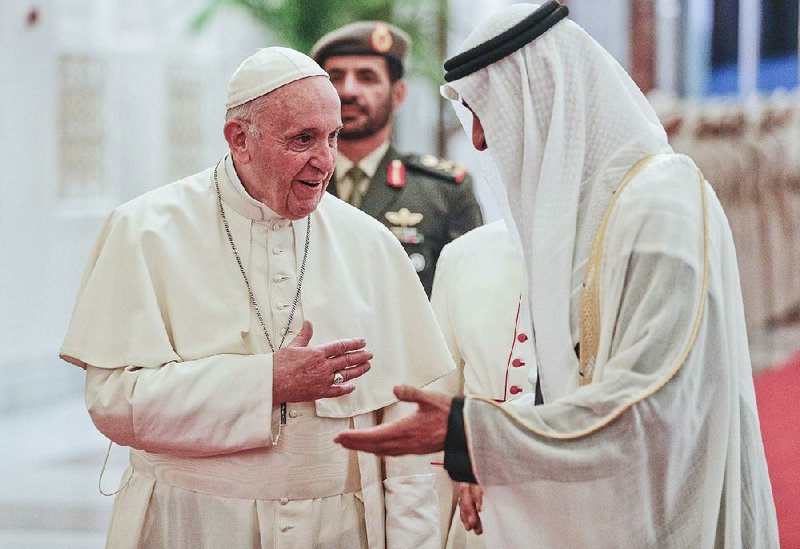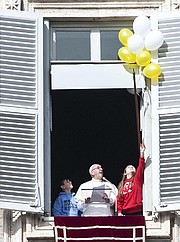ABU DHABI, United Arab Emirates -- Pope Francis landed Sunday in Abu Dhabi on the first-ever papal trip to the Arabian Peninsula, where he is seeking to turn a page in Christian-Muslim relations while also ministering to a thriving Catholic community.
Francis earlier Sunday called for the urgent observation of a limited cease-fire in Yemen reached in December, and for food and medicine to get to the nation's people.
The four-year war has pushed Yemen's small Christian communities into hiding and has devastated the country, creating a humanitarian crisis and leading to the death by starvation of about 85,000 children.
By making his appeal at the Vatican before boarding a plane to the United Arab Emirates -- which has been Saudi Arabia's main ally in its war in Yemen -- the pope avoided embarrassing his hosts with a public call while in the region.
"The population is exhausted by the long conflict, and many, many children are suffering from hunger but they are not able to get to food," Francis said in his noontime Sunday blessing.
"The cry of these children and their parents rises up to God," he added. "I appeal to all sides involved and to the international community to urgently press for respect of the agreements that have been reached, to guarantee the distribution of food, and work for the good of the population."
Later in the day, Abu Dhabi's crown prince, Sheikh Mohammed bin Zayed Al Nahyan, greeted the pontiff with smiles along with Cabinet ministers and an honor guard when Francis landed in the Emirati capital.
Francis traveled to Abu Dhabi to participate in a conference on interreligious dialogue sponsored by the United Arab Emirates-based Muslim Council of Elders, an initiative that seeks to counter religious fanaticism by promoting a moderate brand of Islam. It's the brainchild of Sheikh Ahmed el-Tayeb, the grand imam of Egypt's Al-Azhar, the revered 1,000-year-old seat of Sunni Islam that trains clerics and scholars from around the world.
In a video message to the Emiratis on the eve of his trip, Francis paid homage to his "friend and dear brother" el-Tayeb and praised his courage in calling the meeting to assert that "God unites and doesn't divide."
"I am pleased with this meeting offered by the Lord to write, on your dear land, a new page in the history of relations among religions and confirm that we are brothers despite our differences," Francis said.
In a statement Saturday, Al-Azhar described the meeting as "historic" and praised the "deeply fraternal relationship" between its imam and the pope, which it said even includes birthday greetings. El-Tayeb also met Francis at the airport.
Francis and el-Tayeb today are to address the "Human Fraternity Meeting" that has drawn not only Catholic and Muslim representatives but hundreds of Jewish, Hindu, Buddhist and other Christian faith leaders. It's all part of the UAE's "Year of Tolerance" and its effort to show its openness to other faiths in a region otherwise known for severe restrictions on religions outside of Islam.
"It's something new for the Muslim world, that within the discussion of dialogue, they're talking about interreligious dialogue across the board," beyond basic Christian-Muslim relations, said Marco Impagliazzo, president of the Community of Sant'Egidio, a Rome-based Catholic organization active in interfaith relations who will be attending the conference.
Francis' other main initiative in Abu Dhabi is a giant Mass on Tuesday in the city's main sports arena that is expected to draw about 135,000 people in what some are calling the largest show of public Christian worship on the Arabian Peninsula. There, Francis will see firsthand a Catholic community that is big, diverse and dynamic, at a time when the wider Mideast has seen an exodus of Christians fleeing persecution at the hands of the Islamic State militant group and others.
The government gave a day off from work for all private-sector workers who expect to be among the attendees. More than 1,000 buses, from Dubai and other parts of the country, are to take pilgrims to the Mass.
The first Catholic church in the country was built in 1965, six years before the UAE was actually founded. While only citizens can own land in the UAE -- a significant obstacle to building churches -- the royal family has donated or leased land and subsidized utility costs for new churches.
Since the country has no native-born Catholic clerics, the pastoral needs of these Catholics are attended to by a few dozen priests from around the world who celebrate Mass in a variety of languages, such as Arabic, English and Tagalog.
"We are purely a migrant church," said Bishop Paul Hinder, leader of the Apostolic Vicariate of Southern Arabia, which includes the United Arab Emirates and Yemen.
Of the more than 9 million people now living in the UAE, about 1 million are Emirati while the rest are foreigners drawn to the oil-rich federation to work in areas such as white-collar finance and construction.
The Catholic Church believes there are about 1 million Catholics in the UAE. Most are Filipino or Indian, many of whom have left behind families for work and can face precarious labor conditions that human-rights groups regularly denounce.
Hinder said that while there had been real progress in the country, he had also briefed the pope on the difficult situation of the Catholics in the UAE who face job insecurity that could result in them being forced to leave the country. "That gives a certain tension," he said.
"The church has a unique role because it becomes home," said Brandon Vaidyanathan, chair of the sociology department at Catholic University in Washington, who grew up in Dubai. "It becomes a place of belonging" in a country where foreigners can live, work and practice their faith but will never gain citizenship.
Vaidyanathan, who converted from Hinduism to Catholicism while living in Dubai, said the UAE's religious tolerance is commendable given the trends of the region. He noted the "unprecedented" nature of the government's invitation to Francis, its donation of land for churches and even a recent decision to rename a mosque "Mother Mary of Jesus."
Yet he pointed to the difference between freedom to worship and true religious freedom. Crosses, for example, can only be displayed inside churches, proselytizing for faiths other than Islam is banned and Muslims are forbidden from converting.
Francis will likely focus on issues of religious freedom and fraternity in his public remarks. Unlike all his other foreign trips, he will not deliver a political speech.
Vatican spokesman Alessandro Gisotti said the reason was to give greater emphasis to his speech to the interfaith conference. He dodged a question about whether Francis would raise Yemen's yearslong war in his private talks with the UAE's ruler. The UAE is deeply involved in the Saudi-led war in the Arab world's poorest country, where tens of thousands have been killed and millions face food and medical shortages.
"I don't know if the Holy Father will confront it publicly or privately, but certainly on many occasions, even recently, he has underlined the need to search for peace in particular to guarantee the humanitarian rights of the population, especially children," Gisotti said.
Hinder said he had been unable to reach Yemen because of the war but that working on specific cases "behind the curtain" sometimes yielded positive results. He added that a public statement by Francis on Yemen was possible, but "I am quite sure that he will speak about the drama in a more discreet way."
"In this part of the world, delicate issues, they are better treated not too much in the public. That's my experience," Hinder said.
Aid groups working in Yemen hope Francis won't just rely on his public appeals, but that he will use his visit to take his message to the Emirati leadership in person.
The Catholic Agency for Overseas Development, the overseas aid group of the Catholic Church in England and Wales, recently joined a coalition of British humanitarian organizations in appealing for Yemen's limited cease-fire to hold so humanitarian aid can reach the most vulnerable.
"We have confidence in the greatness of the pope to be our advocate and the advocate for the Yemeni people," said Giovanna Reda, the agency's head of humanitarian programs for the Middle East.
Information for this article was contributed by Nicole Winfield of The Associated Press and by Jason Horowitz of The New York Times.
A Section on 02/04/2019


